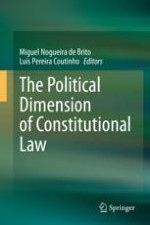2020 | OriginalPaper | Buchkapitel
“Liquid Constitutions” and Their Informal Changes
verfasst von : Carlos Blanco de Morais
Erschienen in: The Political Dimension of Constitutional Law
Aktivieren Sie unsere intelligente Suche, um passende Fachinhalte oder Patente zu finden.
Wählen Sie Textabschnitte aus um mit Künstlicher Intelligenz passenden Patente zu finden. powered by
Markieren Sie Textabschnitte, um KI-gestützt weitere passende Inhalte zu finden. powered by
